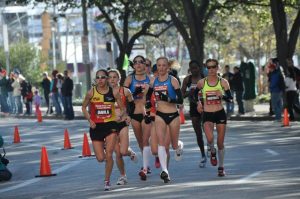Success on The Big Stage: What it took for top marathoners to succeed at the U.S. Olympic Trials
By Cindra Kamphoff, Ph.D.
 I had the privilege of attending the U.S. Olympic Trials for the marathon last weekend. Roughly 300 of the fastest men and women in our country took to the streets of Houston with the hopes of representing our country in the London Olympic Games this summer.
I had the privilege of attending the U.S. Olympic Trials for the marathon last weekend. Roughly 300 of the fastest men and women in our country took to the streets of Houston with the hopes of representing our country in the London Olympic Games this summer.
Their finishing times didn’t matter. Instead, they were all racing to fill the three coveted spots for both men and women. They were working to fulfill lifelong dreams of representing the United States at the Olympics.
Qualifying for the Games came down to one day that only occurs every four years. To qualify, both their bodies and minds had to be perfect. Physically, they had to ensure they were neither undertrained or overtrained. Psychologically, they had to control their self-defeating thoughts —which even elite athletes have — and get to the starting line as confident as possible.
In the weeks before the Olympic Trials, I had been working on a research project in which I interviewed these Olympic Trials qualifiers and their coaches. It has been one of the most enjoyable research projects I’ve conducted, because it is a joy to talk to the best of the best.
That research project allowed me to watch the Trials through my psychological lens. Since I had talked to some of the athletes and coaches before the Trials, I knew what they were thinking, what they were feeling and what goals they were shooting for as I watched the weekend’s events unfold.
 I also listened closely to what the athletes said during the weekend and watched their behavior intently. Here are some of my observations about the best of the best runners in our country.
I also listened closely to what the athletes said during the weekend and watched their behavior intently. Here are some of my observations about the best of the best runners in our country.
- The runners who performed up to their potential did not let the pressure of the big race get to them. Many gave each other hugs at the start and smiled before the gun went off. They were enjoying themselves and having fun.
- The runners who shone brightest embraced the drama of the big stage. They felt no fear of failure and weren’t dreading the race. Instead, they rose to the occasion and recognized that the big stage would help them perform better.
- They believed in their fitness and in their ability despite bad training runs and/or injuries. Meb Keflezighi, the men’s winner, missed three of the last 10 weeks of his marathon training leading up to the Trials. He had forgotten that he had tucked his Breathe Right nasal strips into his left running shoe before the New York City Marathon in November. After the race he developed a terrible blister that became severely infected. Instead of focusing on the training he had missed, he focused on how he would be better prepared for the Trials with extra rest — which demonstrates his confidence in his fitness and ability to perform.
- The runners who did well during the Trials were able to control their emotions during the race. They were poised, focused and in control of their emotions during the most important race of their lives. They kept their cool when the heat was on. It was only after they crossed the finish line that their emotions were evident to their competition and observers.
- The marathoners expected to experience some discomfort while running the 26.2-mile race, but they also knew they would feel great during the race. I heard Amy Hastings, who finished fourth in the women’s race, say before the race, “I know there will be good miles and bad miles.”
- The marathoners used mental skills. Shalane Flanagan, the winner of the women’s race, described during the press conference after the race that using visualization helped her mentally prepare for a good race. “The marathon is a really hard event and any advantage you can give yourself is nice,” she said. Visualization gave her that advantage by improving her confidence going into the race. She knew what to expect because she had already seen herself performing well on the course before she arrived in Houston.
There is little doubt to me after watching the Trials last week that a marathon — or any competition, for that matter — is won or lost on the playing field that exists six-inches between the ears. Studies in sport psychology show that athletes who also train their minds by receiving mental training outperform those who don’t. More and more athletes are recognizing that they must develop the mental side of sport and competition —and they are speaking publicly about it.
Regardless of the sport you play or the type of performance you engage in, join me in following these elite athletes. You can use these six observations to improve your performance whether you are a marathoner or not. If you do, you will feel confident and ready to perform up to your potential.
